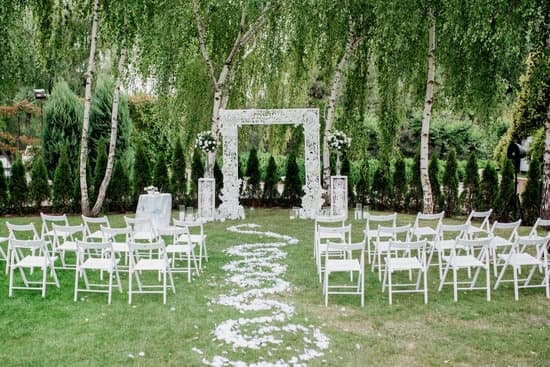Are you wondering how much liquor per person for a wedding? Calculating the right amount of alcohol for your big day is crucial to ensuring that all guests are properly taken care of. From determining the number of guests to customizing the calculation based on personal preferences and budget constraints, there are many factors to consider when planning for the beverages at your wedding.
When it comes to planning a wedding, there are countless details to consider – and the amount of liquor needed is no exception. Whether you’re having a small and intimate gathering or a large and extravagant celebration, understanding how to calculate the right amount of alcohol is essential for a successful event.
In this article, we will delve into the various aspects of determining how much liquor per person for a wedding. We’ll discuss factors such as estimating the number of guests, selecting the types of drinks to offer, and considering non-alcoholic options. Additionally, we will provide tips and recommendations for customizing your calculations and ensuring that you have enough beverages to keep everyone at your wedding happy and hydrated throughout the festivities.
Determining the Number of Guests
When it comes to planning the amount of liquor needed for a wedding, one of the most crucial steps is accurately estimating the number of guests who will be attending. Failing to do so can result in either shortage or excess of liquor, both of which can lead to unnecessary stress and additional expenses. Here are some tips on how to determine the number of guests and ensure you have the right amount of liquor for your wedding:
- Create a guest list: Start by creating a comprehensive list of all the individuals you plan to invite to your wedding. This will help you get an initial estimate of the number of attendees.
- Consider potential plus ones: Keep in mind that some guests may bring a date or a plus one. While not all invited guests will bring someone with them, it’s important to factor this possibility into your estimation.
- Send out RSVPs: Sending out RSVP cards with your invitations can provide you with a more accurate count of how many guests will be attending. This step is especially helpful for larger weddings where estimating numbers can be more challenging.
- Account for children and non-drinkers: Remember that not all guests will consume alcohol, including children and those who prefer non-alcoholic beverages. It’s important to consider these individuals when calculating how much liquor per person for a wedding.
- Factor in no-shows: Inevitably, some invited guests may not be able to attend. While it’s difficult to predict exactly how many people won’t show up, factoring in a certain percentage of no-shows can help avoid over-purchasing liquor.
By taking into account these considerations and being as thorough as possible when estimating the number of guests, you’ll be better equipped to calculate the appropriate amount of liquor needed for your wedding celebration.
Calculating the Types of Drinks
When planning for a wedding, one of the crucial tasks is determining the types of drinks to offer based on the preferences of the guests and the season in which the event will take place. Consideration must be given to both alcoholic and non-alcoholic options to accommodate all attendees.
Alcoholic Beverages
When deciding on the types of alcoholic beverages to provide, it’s important to consider popular choices such as beer, wine, and liquor. Additionally, it’s essential to take into account any specialty cocktails or signature drinks that may be offered. The decision on which specific liquors to include should be based on what is most commonly consumed by the majority of guests.
Non-Alcoholic Options
In addition to alcoholic beverages, offering a variety of non-alcoholic options is equally important. This can include soft drinks, juices, mocktails, and water for those who do not consume alcohol. It’s essential to ensure there are enough non-alcoholic options available for all guests so that everyone can enjoy refreshments regardless of their drinking preferences.
Seasonal Considerations
The time of year when the wedding takes place should also be factored into the decision-making process for drink selections. For example, if it’s a summer wedding, lighter and more refreshing beverages may be preferred. In contrast, winter weddings might call for warmer and heartier drink options suitable for colder weather. By considering these seasonal factors when deciding on drink varieties, couples can ensure that their guests have an enjoyable drinking experience tailored to the time of year.
Understanding how much liquor per person for a wedding requires careful consideration of both alcoholic and non-alcoholic beverage options based on guest preferences and seasonal factors. By taking these elements into account when determining drink varieties to offer at a wedding, couples can better calculate the right amount of liquor needed for their special day while ensuring that all guests’ needs are met.
Factors to Consider
When it comes to determining how much liquor per person for a wedding, several factors need to be taken into consideration in order to make an accurate calculation. These factors can greatly impact the amount of alcohol needed for the event, so it is important to carefully assess each one.
- Length of the Event: The duration of the wedding celebration will significantly affect how much liquor is required. A shorter event may require less alcohol per person compared to a longer one.
- Time of Year: The season and weather conditions can influence how much guests are likely to drink. For example, people might consume more refreshments during a summer wedding compared to a winter one.
- Drinking Habits of the Guests: Understanding the drinking habits and preferences of your guests is crucial in determining how much liquor will be needed. Some crowds may drink more heavily than others, so this should be factored into your calculations.
Taking these factors into account when planning for your wedding can help prevent overordering or running out of liquor during the celebration. By carefully assessing these elements, you can ensure that you have an appropriate amount of alcohol for your guests while also keeping within your budget constraints.
It’s important to remember that these factors are just some things that need to be considered when determining how much liquor per person for a wedding. Each wedding is unique, and taking all relevant components into consideration will ultimately result in a more accurate estimation.
The General Rule
When it comes to planning the beverage selection for a wedding, one of the most important considerations is how much liquor to provide per person. Understanding industry standards and etiquette can help ensure that you have enough drinks for your guests without overdoing it. By following some general guidelines, you can calculate the right amount of liquor to serve at your wedding.
Industry Standards for Liquor Per Person
The industry standard for calculating the amount of liquor per person for a wedding is typically based on the length of the event. For a full-service bar at a 4-5 hour reception, you can estimate that each guest will consume about 5-6 drinks throughout the night. This includes a combination of beer, wine, and cocktails. Keep in mind that this estimate may vary depending on factors such as your guest list demographics and drinking preferences.
Calculating Based on Guest List
To determine how much liquor you need for your wedding, start by creating an accurate guest list. Once you have a final headcount, use the industry standard as a baseline to calculate the total amount of drinks needed. For example, if you have 100 guests attending a 4-hour reception, you would plan for approximately 600 total drinks.
Customizing Based on Preferences and Budget
While industry standards provide helpful guidelines for planning the amount of liquor per person for a wedding, it’s also important to consider factors such as your personal preferences and budget constraints. If you know that your guests predominantly prefer beer over cocktails, you might adjust your calculations accordingly. Additionally, working with a professional bartender or beverage service can provide valuable insight into customizing your drink selection based on both taste and cost considerations.
Ultimately, understanding how much liquor per person to plan for at your wedding involves careful consideration of industry standards and etiquette while also allowing flexibility based on individual preferences and circumstances. By taking time to accurately estimate and customize the amount of drinks needed, you can ensure that your guests will enjoy an appropriate selection of beverages throughout your special day.
Customizing the Calculation
When planning for a wedding, it’s important to ensure that the amount of liquor available is tailored to fit both personal preferences and budget constraints. Customizing the calculation of how much liquor per person for a wedding can help you create a memorable event while staying within your means.
One way to adjust the amount of liquor is by considering the preferences of the guests. If you know that a large portion of your guests prefers wine over other types of drinks, you may choose to allocate more of your budget towards wine and reduce the amount spent on other liquors. Additionally, if you have specific signature cocktails or favorite brands in mind, you may want to prioritize those selections when determining how much liquor to purchase.
Another factor to consider when customizing the calculation is the length of the event. If you are having an all-day affair, such as a brunch followed by an evening reception, it’s important to account for this extended timeframe when estimating how much liquor per person for a wedding is needed. Guests are likely to consume more beverages throughout a longer event, so adjusting your calculation based on event duration is crucial.
It’s also essential to be mindful of budget constraints when customizing the calculation for how much liquor per person for a wedding. By carefully planning and making strategic choices about which liquors and beverages to offer, you can stay within your budget while still providing an enjoyable variety for your guests.
| Adjustment Factor | Consideration |
|---|---|
| Guest Preferences | If many guests prefer wine over other drinks, allocate more budget towards wine |
| Event Duration | Longer events require more drinks per person; plan accordingly |
| Budget Constraints | Make strategic choices about which liquors and beverages to offer within budget limits |
Considering Non-Alcoholic Options
When planning the amount of liquor needed for a wedding, it’s crucial to consider the importance of offering non-alcoholic beverages as well. Not everyone drinks alcohol, so it’s essential to provide options that cater to all guests. Non-alcoholic beverages also factor into the overall amount of drinks needed, so it’s important not to overlook their significance in the planning process.
When considering non-alcoholic options, it’s important to take into account the preferences and dietary restrictions of guests. Offering a variety of non-alcoholic beverages such as soda, sparkling water, mocktails, and fruit juices ensures that there is something for everyone to enjoy. It’s also beneficial to provide options that complement the chosen menu and theme of the wedding.
In addition to catering to non-drinkers, including a range of non-alcoholic beverages can also help in managing the overall amount of liquor needed for the event. By offering appealing non-alcoholic options, guests who may have otherwise opted for alcoholic drinks might choose a non-alcoholic alternative instead.
This can potentially reduce the overall consumption of alcoholic beverages and impact how much liquor per person for a wedding needs to be calculated. Overall, considering non-alcoholic options not only enhances guest experience but also plays a significant role in determining the total amount of drinks required for the wedding celebration.
Final Tips and Recommendations
In conclusion, it is essential to understand the significance of calculating the right amount of liquor for a wedding. By accurately estimating the number of guests and considering factors such as event length and drinking habits, couples can ensure that they have enough drinks to cater to their attendees’ preferences.
While industry standards and etiquette recommend a certain amount of liquor per person for a wedding, it’s crucial to customize this calculation based on personal preferences and budget constraints. Couples should also consider offering non-alcoholic options to accommodate all guests, factoring these beverages into the overall amount of drinks needed.
Moreover, taking into account the option of hiring a professional bartender can streamline the serving process and provide an expert opinion on the appropriate quantity of liquor for the event. By following these tips and recommendations, couples can feel confident in their planning and ensure that their wedding bar suits the needs and tastes of their guests. Overall, understanding how much liquor per person for a wedding is an essential aspect of successful wedding planning.
Frequently Asked Questions
How Many Bottles of Liquor Do I Need for a 150 Person Wedding?
The number of bottles of liquor needed for a 150 person wedding depends on the types of drinks being served and the drinking habits of your guests. A general rule of thumb is to plan for one drink per person per hour.
How Do You Calculate Drinks Per Person for a Wedding?
To calculate the drinks per person for a wedding, you should consider the duration of the event, the variety of drinks offered, and the drinking habits of your guests. It’s important to have a good mix of alcoholic and non-alcoholic options.
Is It Cheaper to Supply Your Own Alcohol for a Wedding?
It can be cheaper to supply your own alcohol for a wedding, as long as you do your research and purchase from wholesalers or during sales. However, it also requires careful planning and storage, as well as responsible serving to ensure everyone’s safety.

I have been involved in marriages for over 20 years helping couples and singles understand more about them.





